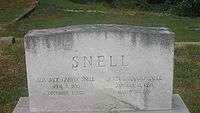Ada Jack Carver Snell
Ada Jack Carver Snell (April 7, 1890 – December 1, 1972) was an American short story writer originally from Natchitoches, Louisiana.
Ada Jack Carver Snell | |
|---|---|
| Born | April 7, 1890 |
| Died | December 1, 1972 (aged 82) Minden, Webster Parish, Louisiana, U.S. |
| Alma mater | Judson College (Alabama) |
| Occupation | Short story writer, principally 1915-1925 |
| Spouse(s) | John Barnard Snell (married 1918-1959, his death) |
| Children | John Hampton Snell (1919-1921) David Snell (1921-1987) |
| Parent(s) | Marshall W. Carver Ada W. Jack Carver |
Background
Ada Snell was born to a middle class Baptist couple, Marshall H. Carver and the former Ada W. Jack. Her maternal grandfather, Colonel William H. Jack of Natchitoches, kept pheasants, eagles, and peacocks.[1] Ada graduated from Judson College in Marion, Alabama,[2] the alma mater of another Natchitoches-area resident, the naturalist Caroline Dormon.
On February 25, 1918, Ada married John Barnard Snell (January 21, 1884 – March 20, 1959) in Shreveport, Louisiana, while he was on furlough from the United States Army during World War I. John Snell was from Minden in Webster Parish in northwestern Louisiana. From 1913-1917, Snell had been the principal of the newly established Minden High School. On his return to Minden after military service, he operated his own cotton gin and was a long-term elected member of the Webster Parish School Board.[3]
Literary works
Ada Snell's short stories reflect a Louisiana setting, particularly the multicultural Cane River country of her native Natchitoches Parish.[4] Snell's works began about 1917 and peaked in the middle 1920s. "The Joyous Coast" was published in Southern Women's Magazine in 1917. In 1925, Snell wrote the acclaimed "Redbone", carried in Southern Stories by A. Turner. In 1926, she published "The Raspberry Dress" in The Century, a story of a complex relationship between a grandmother and her granddaughter. Carver's best stories feature older women. She had a French grandmother who encouraged her intellectual growth and literary imagination.[4]
Three other works in 1926, "Treeshy", "The Old One", and "Maudie" were published by Harper's Magazine. Also in 1926, she wrote "The Cajun", a bigoted play portraying Cajuns. Caroline Dormon wrote a tribute to Snell in the Minden Signal Tribune, noting that despite her relative inexperience as an author Snell had won prizes over older, established writers.[5] In 1927, Snell penned "Bagatelle". After 1928, her work slowed considerably. A children's play, "The Clock Strikes Tomorrow", was written and produced in 1935. Another short story, "For Suellen with Love", appeared in a college review in 1949. The Collected Works of Ada Jack Carver appeared posthumously in 1980.[4]
Snell was an occasional guest at Cammie G. Henry's popular Melrose Plantation in Natchitoches Parish, where she met the authors Francois Mignon and Lyle Saxon, a native of Washington state who wrote extensively on New Orleans culture.[6]
Five theses or dissertations have been written about Ada Snell. In 1930, A. Dodson wrote a thesis entitled "Ada Jack Carver". In 1931, M.I. Bowman wrote the thesis, "The Negro in the Works of Three Contemporary Louisiana Writers", including Snell. In 1975, O. L. Ford wrote the dissertation, "Ada Jack Carver: A Critical Biography." In 1986, Mildred Acres Houston submitted her master's thesis at Northwestern State University in Natchitoches entitled, "The Shadow of Africa on the Cane: An examination of Africanisms in the Fiction of Lyle Saxon and Ada Jack Carver." In 1994, D. M. W. Taylor wrote the dissertation, "Louisiana's Literary Legacy: A Critical Appraisal of the Writings of Ada Jack Carver".[4]
Death

John Hampton Snell (February 19, 1919–March 26, 1921),[7] the Snells' first child, died in a household accident at the age of two, only two days before the birth of his brother, David Snell (1921–1987). After graduation from Minden High School and Louisiana State University in Baton Rouge, David Snell became a journalist and cartoonist for Life Magazine and several other national publications.
John and Ada Snell are interred beside "Our Little Son John Hampton Snell", the inscription on the child's grave marker at the old section of Minden Cemetery. All of Ada's personal papers are believed to have been destroyed at her death upon her request. It is unknown if any manuscripts were pending. Numerous unresolved mysteries cloud the connection between her personal life and her literary output. She was a widow for the last thirteen years of her life.[4] She apparently wrote nothing for four years after the time of John Hampton's death and David's birth. Her death occurred in the same month, December 1972, as the closing of Life Magazine, her son's principal employer.
References
- Earlene Mendenhall Lyle, The Minden Cemetery: A Peaceful Resting Place, Self-published, June 2004, p. 38
- Charles Champlin, "A Stamp of Approval for a Friend", Los Angeles Times, July 9, 1987
- Obituary of John Barnard Snell, Minden Herald, March 23, 1959
- "Carver, Ada Jack". novelguide.com. Archived from the original on October 13, 2011. Retrieved September 5, 2009.
- Caroline Dormon, "Ada Jack Carver - Webster parish Writers - Noted as New Voice from the Old South", Minden Signal Tribune and Springhill Journal, November 6, 1926.
- "'Findagrave.com: Ada Jack Carver Snell". findagrave.com. Retrieved September 4, 2009.
- Minden Cemetery records, Minden, Louisiana